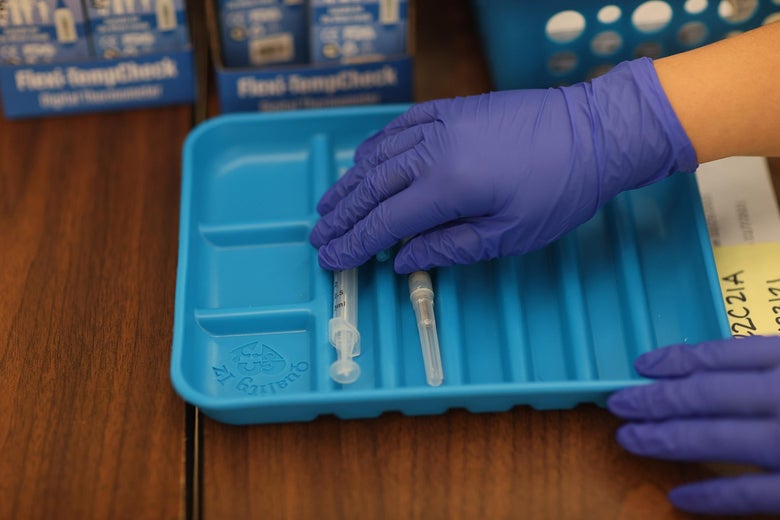
Mike Fesi, a Republican state senator in Louisiana, didn’t trust coronavirus vaccines. So earlier this year, when his colleagues seized their chance to get inoculated against the virus, Fesi refused. He figured he didn’t need the vaccines, and he claimed, without evidence, that they had killed a friend of his family. But then Fesi got a nasty surprise: A month ago, he was abruptly vaccinated, and the vaccine made him sick. That’s because the vaccine he got wasn’t Pfizer, Moderna, or Johnson & Johnson. It was COVID-19.
If you’re one of the millions of people who have already chosen to get one of the federally approved vaccines, you don’t need to be persuaded that it’s the smart decision. But many other people do. They’re wary of the vaccines, and they think they can avoid vaccination or wait till they’re ready. That’s a mistake, because all of us are going to get vaccinated one way or the other. Sooner or later—and probably sooner, since the supercharged delta variant already accounts for 10 percent of U.S. infections, and that share is doubling every two weeks—people who don’t take one of the approved vaccines will get the virus. They might think of that as an alternative to vaccination, but it’s not. The virus will do the same thing the vaccines do: It will provoke their immune systems to develop antibodies. The difference is that the virus, unlike the vaccines, will attack their bodies and quite possibly kill them.
So if you haven’t been vaccinated, or if you’re talking to someone who hasn’t been vaccinated, the right question to ask isn’t whether to get vaccinated; it’s which vaccine to take. Would you rather come in, at a time of your choosing, to get a vaccine that’s been carefully tested for safety? Or would you rather be ambushed with a vaccine that has killed millions of people?
The approved vaccines aren’t completely risk-free, but they’re pretty close to it. The worst known side effect, a blood-clotting syndrome, occurred in 28 of the 8.7 million people who got the Johnson & Johnson vaccine. That’s about three cases per million. Some people have died after getting the vaccines, but fewer than you’d expect based on the normal death rates for people in those age brackets. In other words, vaccinated people, like unvaccinated people, die of other causes, such as heart attacks or strokes—but they don’t die from getting the vaccine. Instead, the death rate among vaccinated people is lower, because they’re protected from a deadly virus.
Compare that record to COVID-19. Even if you attributed every reported death of a vaccinated person to the vaccines, the fatality rate would be 0.0017 percent. The estimated U.S. fatality rate from COVID-19, calculated by dividing the number of deaths by the number of known infections, is 1.8 percent. That’s 1,000 times higher than the calculated risk from the vaccines. The real U.S. fatality rate from COVID-19 is probably much lower than 1.8 percent, because many mild infections go unreported. But the fatality rate from the vaccines is also much lower than 0.0017 percent, because among the 300 million doses administered so far in the United States, only three deaths have been persuasively connected to a vaccine.
Suppose we blame those three deaths on the vaccine in question, which was Johnson & Johnson. In that case, here’s the score card among the four vaccines currently circulating in the United States: three known deaths from Johnson & Johnson, zero from Pfizer, zero from Moderna, and about 600,000 from COVID-19.
The approved vaccines are also better than COVID-19 at immunizing you against further coronavirus infection. In the latest studies, people who recovered from COVID-19 showed pretty good immunity against reinfection, but the CDC-recommended Pfizer or Moderna still made the immunity stronger. In particular, these vaccines supplied better protection against new variants of the virus than previous COVID-19 infection did. So COVID-19 isn’t just vastly more dangerous than the vaccines. It’s also inferior as a form of protection.
Mike Fesi was lucky. COVID-19 made him sick, but he got over it. Now he’s back at work, voting for legislation that would block vaccine requirements. He learned nothing from his experience. But you can learn from it. If, like Fesi, you reject the federally tested vaccines, the danger isn’t that you’ll end up like he did. The danger is that you’ll end up like another Louisiana Republican, the late Congressman-elect Luke Letlow, who was killed by COVID-19 in December. Letlow, who was 41 and apparently healthy, got infected just before the first vaccines became available. He never had a chance to get vaccinated. You do.
Article From & Read More ( Maybe We’re Asking Vaccine Skeptics the Wrong Question - Slate )https://ift.tt/2U0diSN
Health
Bagikan Berita Ini














0 Response to "Maybe We’re Asking Vaccine Skeptics the Wrong Question - Slate"
Post a Comment